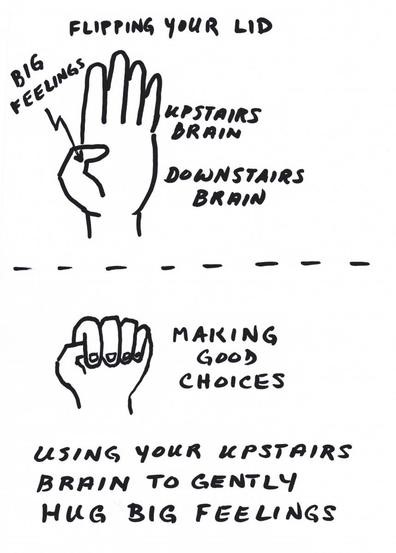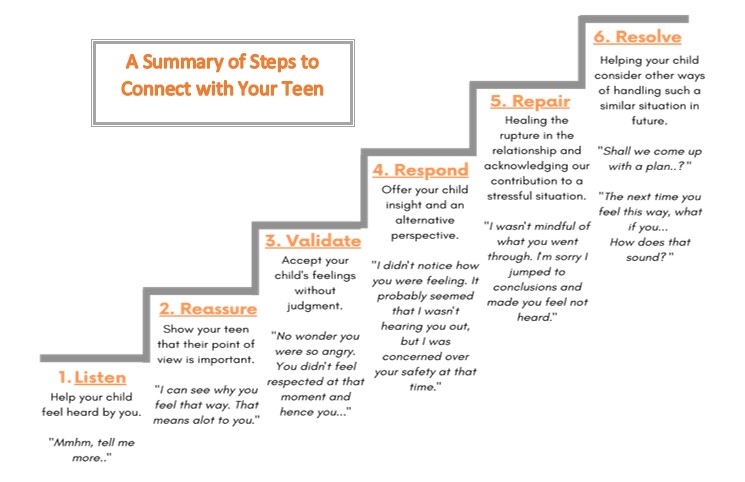“We may not be able to prepare the future for our children, but we can at least prepare our children for the future." – Franklin Roosevelt
Neuropsychiatrist Daniel Siegel and psychologist Tina Payne Bryson co-authored a popular parenting book titled “The Whole-Brain Child”1, in which they explained the model on how all of us have an “upstairs brain” which controls our logical and reflective functions, and a “downstairs brain” which is responsible for our fight-and-flight and emotional responses. During times of stress, most teenagers and adults will experience their “downstairs brain” switching on (a.k.a “flipping your lid”). As parents, your role is to help your teenager balance out the effects of the “upstairs” and “downstairs” brain. This will help foster resilience in them as they go through stressful times.

Here are some steps for you to connect with your teen in a way that allows the integration of the “upstairs brain” and “downstairs brain”:2
- Listen3
To connect with your teen’s “downstairs” brain, you have to use your “downstairs” brain to do so. We know that listening is important, but the how in listening is far more important. We listen using verbal and non-verbal cues such as our eye contact, body language and tone of voice. Listening is about giving time to your teen to put their thoughts and feelings into words, and for us to pause. We need to refrain from cutting them off mid-sentence and the natural urge to stick with our own response.
You can try using the starting statements below to show your teen that you want to listen intently:
“That sounds important. I want to find out more…”
“Could you share more on that?”
- Reassure
Your teen needs the reassurance that their perspective is important and that you care about them no matter how they may be thinking or feeling. It helps them to feel more comfortable sharing their thoughts and feelings with you when they feel that what they are saying is worth listening to, and not dismissed, ignored or played down.
“I’m glad you shared that with me, and I want you to come to me when you have a problem.”
“I can see why you feel so upset. This means alot to you.”
- Validate
Validate means accepting and tending to your teen’s thoughts and feelings. This does not mean you condone their behaviour, but that what they are thinking or feeling are not being judged. Remember the “downstairs” brain? We have to attend to their emotions first before being able to speak to them in a rational way.
“I know you didn’t want to hear me say that. It must have felt so unreasonable that it was time to sleep, when you wanted to keep using your laptop.”
“I get why you’re mad. You think that you are not going to do well for Promos, hence you feel frustrated with yourself.”
- Respond
Only after the above steps have been done, then use your “upstairs” brain to communicate with your teen on what has actually occurred from your calm perspective. This will offer insight into a situation and provide your teen with an alternative point of view, which allows them to consider now that you have tended to their emotions.
“You think that your friend didn’t like you because he gave you the look. But I have seen both of you play and study together so he does enjoy his time with you. You felt really rejected at that moment, but I think he didn’t do it deliberately.”
- Repair
There will be times when a break happens in your relationship with your teen, and there may be lingering resentment, fear and shame. It is easy to just act as if nothing happened instead of talking through the problem. When there is a rupture in the relationship, do try to repair it as quickly as possible. Repair also involves accepting and even apologising for our role in what happened.
“I’m sorry if it felt like I was interrogating you. I didn’t realise how my actions came across at that moment.”
“You are trying your best and working hard for your exams. I didn’t take the time to consider that and nagged at you to finish your revision instead.”
- Resolve
Lastly, collaborate with your teen to come up with a plan or solution for similar situations in the future. When you shift the focus from a ‘punish and comply’ approach and instead spend time to connect and redirect your teen sensitively, it may help to avoid a similar situation from re-occurring.
“I would love to know how it goes for you from here-on.”
“The next time you feel this way, you can try this …”

In a nutshell, do focus on connecting with your teen’s “downstairs brain” before “climbing the steps” in engaging their “upstairs brain”. We hope that in this period of new routines and uncertainty, these steps will help you re-connect with your teen meaningfully. Stay healthy and keep calm!
If you have more queries or think your teen may benefit from more support, you can drop us an email at [email protected] .
Warmest regards,
The RGC team

The RGC Team from L-R: Mei Hui, Kah Hwee, Alexis, Paul, Zull, Jeffrey
________